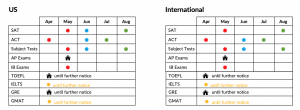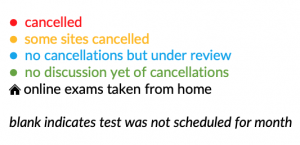Updated 3/23/20
For the first time in history, the ACT and SAT have cancelled exams en masse. AP exams will be taken online from students’ homes. Subject Tests have been hit, too. Many students, parents, and counselors are coming to us with the same question: My test was cancelled. What should I do?
Below is our advice on what to do if your SAT, ACT, Subject Test or AP is cancelled, rescheduled, or modified due to coronavirus.
Which Tests Have Been Cancelled updated 3/23/20
A lot will change over the next few weeks and months, but here’s a quick rundown of cancelled and modified exams.


These charts will certainly change. We’re still waiting to hear about June exams. There’s also been talk that new test dates for SAT and ACT might be added to the calendar once social distancing is over.
We’ll be keeping this chart updated as we learn more.
Class of 2021 U.S. Students: What To Do Next
ACT
- Which tests? Prepare and register for the June exam with July and September as back-ups. If ACT adds a new make-up date, register for it.
- How to prep? Students who can should continue preparation as they have been. For most that’s about 4–5 hours of studying per week: a mix of practice exams, tutoring, independent study, etc. For students who can’t maintain that pace, we recommend cutting back slightly for the next few weeks, then returning to the normal pace no later than mid April.
- Why this plan? You want to be ready if the test does happen in June. If it does, it also likely means your school is back in session by then. Once school restarts, the academic pace will be intense as teachers try to catch up on missed time. You don’t want to be dealing with that stress and cramming for the ACT at the same time. Finally, you’ll want to stay sharp in case new dates are added later this spring or in early summer.
SAT
- Which tests? Prepare and register for the June exam with August and October as back-ups. If the College Board releases March or May make-up dates, register for them.
- How to prep? Students who can should continue preparation as they have been. For most that’s about 4–5 hours of studying per week: a mix of practice exams, tutoring, independent study, etc. For students who can’t maintain that pace, we recommend cutting back slightly for the next few weeks, then returning to the normal pace no later than mid April.
- Why this plan? You want to be ready if the test does happen in June. If it does, it also likely means your school is back in session by then. Once school restarts, the academic pace will be intense as teachers try to catch up on missed time. You don’t want to be dealing with that stress and cramming for the SAT at the same time. Finally, you’ll want to stay sharp in case new dates are added later this spring or in early summer.
Subject Tests
- Which tests? June is the best Subject Test date for most students because they are likely currently taking the class for that exam. Prepare and register for June with August as a backup. If the College Board releases May make-up dates, register for them.
- Before you decide: Students who have been planning on taking the SAT Subject Tests need to ask their counselors if they should continue to pursue Subject Tests.
- How to prep? If a student’s counselor says they do still need to pursue Subject Tests, students will need to significantly ramp up their Subject Test prep, likely up to 6-8 hours of studying per week: a mix of practice exams, tutoring, independent study, etc.
- Why this plan? Moving school online means students are going to miss crucial pieces of the curriculum needed for the exam, and extra preparation will be necessary to fill in those gaps. Additionally, June may very well be the only time a student has to take the Subject Tests, as remaining test dates will need to be saved for SAT or ACT testing, so it is more important than ever to do well the first time.
Class of 2021 International Students: What To Do Next
ACT
- Which tests? Not all international sites have been closed for April, and some students may still be able to test. Students will hear from the ACT if their test gets cancelled. Otherwise, prepare and register for the June exam with July and September as back-ups. If ACT releases an April make-up date, register for it.
- How to prep? If a student’s April test site is not yet cancelled, they should continue to prepare as if they will test, but plan to keep in mind their own health and public health when the test gets closer, pending spread of the virus. Otherwise, students who can should continue preparation as they have been. For most that’s about 4–5 hours of studying per week: a mix of practice exams, tutoring, independent study, etc. For students who can’t maintain that pace, we recommend cutting back slightly for the next few weeks, then returning to the normal pace no later than mid April.
- Why this plan? You want to be ready if the test does happen in June. If it does, it also likely means your school is back in session by then. Once school restarts, the academic pace will be intense as teachers try to catch up on missed time. You don’t want to be dealing with that stress and cramming for the ACT at the same time. Finally, you’ll want to stay sharp in case new dates are added later this spring or in early summer.
SAT
- Which tests? The first SAT available for international juniors is the August exam. That being said, it’s possible other dates could be add. For example the College Board could open up the June exam for SAT international students (usually June is just for Subject Tests) and just use the copy of the exam intended for the cancelled May test. Students should register for August as soon as it opens, register for an additional fall exam as a backup, and keep their eyes peeled for news of makeup dates.
- How to prep? With possible makeup test dates in mind, these students should “stay fresh” until we know for sure, but not do any heavy prep in case no exam is available until August. We recommend about one hour of tutoring a week until we know for sure, and will update recommendations as we have them.
- Why this plan? You don’t want to lose all the ground you’ve gained preparing for cancelled test dates, but it doesn’t make sense to stay at full steam in the event that you can’t test until August. Keep your eyes peeled for added international SAT test dates, and maintain light review until then.
Subject Tests
- Which tests? June is the best Subject Test date for most students because they are likely currently taking the class for that exam. Prepare and register for June with August as a backup. If the College Board releases May make-up dates, register for them.
- Before you decide: Students who have been planning on taking the SAT Subject Tests need to ask their counselors if they should continue to pursue Subject Tests.
- How to prep? If a student’s counselor says they do still need to pursue Subject Tests, students will need to significantly ramp up their Subject Test prep, likely up to 6-8 hours of studying per week: a mix of practice exams, tutoring, independent study, etc.
- Why this plan? Moving school online means students are going to miss crucial pieces of the curriculum needed for the exam, and extra preparation will be necessary to fill in those gaps. Additionally, June may very well be the only time a student has to take the Subject Tests, as remaining test dates will need to be saved for SAT or ACT testing, so it is more important than ever to do well the first time.
Class of 2022
Because you have time, your situation’s a bit different. You may want to consider starting the early phases of test prep ahead of schedule. You can take advantage of this slow time while school is out and do foundational work. That way when school ramps back up (and it’s likely to be pretty busy), you’ve got some of your prep steps out of the way.
But that doesn’t mean going all in and starting test prep full force. Instead, we recommend using this time for:
- Taking ACT and SAT diagnostics to choose the exam you will prepare for next year.
- Comparing prep options available to you and picking how you will prep when the time comes next year.
- Working on foundational skills for the Reading section of the test. These skills (like reading speed, analysis skills, and reading charts and graphs) take the longest to learn. Getting a head start will make your test prep faster in next year—and even help in school. You can start by using our Recommended Reading List here or reach out to our experts here for more specific lessons.
AP Exams for All Students updated 3/22/20
The College Board announced that AP exams will be delivered online and all students will take these tests at-home. Every test will be limited to 45 minutes. The multiple-choice portion of all tests will be cut. The content tested will only cover material classes get to by early March. Students will also have two dates to pick from for taking each exam—details about the exact dates and format of the exams is expected by April 3.
Students should first review our blog post, which highlights the list of material the exams will NOT cover. Next, focus on reviewing the content that will be on the exam. For now, don’t worry about strategies for specific FRQ question types until we know for sure on April 3 the exact format of each exam. At the very least, no need to practice multiple-choice anymore!
On April 3, we’ll post recommendations for deciding on which test date is best for your exam and more information about how to prepare for the online test interface.
IB Exams for All Students updated 3/23/20
IB exams for spring 2020 have been cancelled worldwide. Instead, students’ marks will focus solely on coursework components. More details are expected by March 27.
For now, students should continue to focus on the units and coursework their teachers assign. And ask for help if you are struggling to make the transition to online learning.
Need more individualized advice?
The recommendations above are generalized plans. If you have specific questions or want a personalized plan, reach out to our experts here. We’re happy to help in any way we can.
Looking for more resources on coronavirus, education, and testing? See our entire library here.

